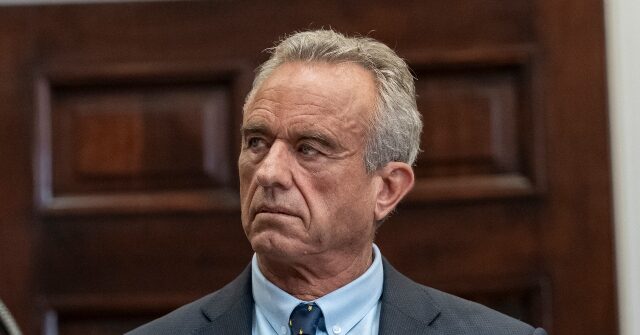American Secretary of Health and Human Services Robert F. Kennedy, Jr., announced on Tuesday that he and Argentine President Javier Milei discussed the “creation of an alternative international health system” to the World Health Organization (W.H.O.).
Kennedy was in Buenos Aires this week for a two-day visit that included meetings with Milei, Argentine Minister of Health Mario Lugones, and Minister of Deregulation and State Transformation Federico Sturzenegger. The American cabinet official visited Argentina after attending the inauguration of President Daniel Noboa in Ecuador.
Milei, a populist libertarian, has sternly criticized the W.H.O. for years for its poor handling of the Wuhan coronavirus pandemic and expressed his intent to exit the organization following President Donald Trump’s electoral victory in America. Trump signed an executive order on the first day of his second term in office beginning the process for America to withdraw from the W.H.O. over its “failure to adopt urgently needed reforms and its inability to demonstrate independence from the inappropriate political influence of WHO member states,” among other issues.
The Milei government formalized its withdrawal from the W.H.O. during Kennedy’s visit on Monday. Both governments issued a joint statement as a result of that visit in which they vowed to jointly promote government policies to improve the health and access to health care of their citizens.
In a message on the visit published on Tuesday, Kennedy also stated that he and Milei discussed creating a parallel international public health structure to counter the malignant influence of the U.N. agency.
“I had a wonderful meeting with Argentine President [Milei] about our nations’ mutual withdrawal from the WHO and the creation of an alternative international health system,” Kennedy wrote, “based on gold-standard science and free from totalitarian impulses, corruption, and political control.”
Kennedy published photos from his visit, including one standing alongside Milei holding a chainsaw representing government spending cuts.
The joint statement published on Tuesday by Kennedy and his Argentine counterpart Lugones did not explicitly state that they had discussed creating an international public health forum, but it did condemn the World Health Organization, which both governments have accused of threatening the sovereignty of independent states.
“The WHO’s handling of the COVID-19 pandemic revealed serious structural and operational shortcomings that undermined global trust,” the statement read in part, “and highlighted the urgent need for independent, science-based leadership in global health.”
“The absence of meaningful reforms, disproportionate financial demands, and the increasing politicization of the organization have ultimately led the United States and Argentina to withdraw from the WHO,” it continued.
A major point of contention for both Trump and Milei is the undue influence that the Communist Party of China reportedly had on the W.H.O.’s handling of the pandemic. The W.H.O. echoed Chinese government stances on major issues in 2020 including discouraging travel bans on people coming from Wuhan and other affected areas in China and denied that evidence existed that the highly contagious coronavirus was capable of human-to-human transmission.
The W.H.O. also routinely bars the country of Taiwan from participating in its events at the behest of China, which falsely claims Taiwan as a province under Beijing’s rule. This decision proved catastrophic as Taiwanese officials warned of evidence of a contagious disease spreading in Wuhan 2019, only to be “mostly ignored.”
While not describing it as a discrete institution, the statement did note that Washington and Buenos Aires would work towards “building a modern global health cooperation model grounded in scientific integrity, transparency, sovereignty, and accountability.”
The challenge to the United Nations body follows the conclusion of the W.H.O.’s largest annual gathering, the World Health Assembly, on Tuesday. This year’s Assembly featured what Director-General Tedros Adhanom Ghebreyesus celebrated as a major victory for the group: the adoption of the “Pandemic Agreement,” an international legal document intended to grant the W.H.O. greater authority in handling a future pandemic. Tedros and other agency leaders began advocating for a global treaty to expand the W.H.O.’s power over large-scale disease emergencies since the early days of the Wuhan coronavirus pandemic, arguing that part of the failure to act rapidly enough against this threat was the result of not being sufficiently empowered.
The final version of the Pandemic Agreement, which neither Argentina nor America participated in passing, calls for the creation of an organizing entity to stockpile and redistribute “safe, quality, and effective vaccines, therapeutics, and diagnostics” as well as other critical medical equipment in the event of a pandemic. This distribution will be based on “public health risk and need, with particular attention to the needs of developing countries.”
“The world is safer today thanks to the leadership, collaboration and commitment of our Member States to adopt the historic WHO Pandemic Agreement,” Tedros declared following the passage of the agreement on May 20. “The Agreement is a victory for public health, science, and multilateral action. It will ensure we, collectively, can better protect the world from future pandemic threats.”
To enter in vigor, 60 countries must ratify the Pandemic Agreement. Exiting the agreement will require a three-year exit process.
Follow Frances Martel on Facebook and Twitter.
Read the full article here
